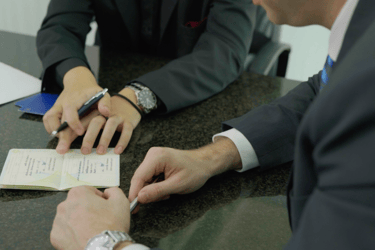WORK PERMIT THAILAND
THAILAND WORK PERMIT - THAT'S HOW IT WORKS!
The work permit is issued by the Labor Department. Violations, i.e. taking up work without a work permit, are severely punished and punishable by imprisonment and heavy fines for the employee and the employer. In contrast to the visa services in Thailand, the work permit is applied for by the employer at the Labor Department.
WHO NEEDS A WORK PERMIT?
"If you sweat, you work!" is a simple rule. A "Work Permit Thailand" is required regardless of whether the work is paid or not. The decisive factor is whether someone is doing a job that requires mental or physical exertion
For this reason, a work permit in Thailand is also required for those who, for example, help family, friends, or acquaintances with their work free of charge during their visit or tourist stay in Thailand.
ATTENTION: Foreign investors who appear to only "formally" hold a position as director of the Thai subsidiary should also apply for a work permit. They are allowed to participate in internal discussions and actions in Thailand. However, even signing a contract with third parties or filing a tax return is legally "work" and requires a work permit.
BUSINESS TRIPS, SHORT-TERM ACTIVITIES AND SHAREHOLDER MEETINGS
In 2018, Thailand introduced exemptions for certain activities for which the requirement of a work permit appears inappropriate. Exceptions apply to the organization of or participation in meetings or conferences. Lectures at workshops, presentations and the like may be held for this purpose. The same applies to the pursuit of artistic and cultural activities or participation in sporting competitions.
Short-term market exploration, trade fair visits, business initiation and the management of a Thai subsidiary are also permitted without a work permit. However, it should be noted that this does not apply to negotiating or acting on behalf of a subsidiary (see above).
THE URGENT WORK PERMIT (UMP)
In urgent cases where an employer needs foreign technicians from abroad to support the employer with certain tasks, an "Urgent Work Permit (UWP)" can be applied for. This is meant, for example, for installations or the repair of machinery. Please note:
This work permit is issued for a maximum of 15 working days.
It can be extended once by a further 15 working days.
It is advisable to submit the application before entering Thailand.
However, if necessary, the applicant can apply for the UWP at the airport or after entering the country at the Ministry of Labor within the framework of the visa regulations.
The authorized agency for Work Permits Thailand can obtain the UWP within one working day.
ATTENTION: Only the Thai company where the work is carried out can submit this application. The service provider or vendor of the machine does not have the right to apply.
WORKING FROM THAILAND (REMOTE WORKING)
Legally speaking, there is no difference between "working in Thailand" and "working from Thailand" when it comes to work permits for Thailand. "Digital nomads" and "remote workers" who work for foreign companies and wish to work from Thailand therefore also require a work permit.
Influencers" and "travel bloggers" also belong to this group. Although the authorities do not give top priority to prosecuting people who work in this way in Thailand, they always take action when a complaint or report is received.
In the absence of a Work Permit Thailand, the "uninvited guests" working in Thailand are then threatened with immediate deportation.
ATTENTION: An exception has been made for holders of a LTR visa and a DTV visa who do not need to apply for a work permit in Thailand. The LTR visa in the "Work from Thailand" category and the DTV visa for digital nomads allow remote work. However, this is also subject to the condition that the employees do not carry out any business activities in Thailand.
The rule for companies is that they must provide proof of paid-up capital of THB 2 million (approx. USD 60,000) for each foreigner employed and generally employ 4 Thai workers. Reduced requirements apply to foreigners who are married to a Thai spouse.
In addition, the foreign employee must hold a position for which there are not enough Thai skilled workers. Foreigners are only allowed to work in jobs that are not exclusively reserved for Thais. In practice, foreigners are therefore often employed in positions such as management, business development, marketing, teaching or as technical experts.
The Thai Board of Investment (BOI) can grant exceptions here as part of an investment promotion program. The company may hire foreign professionals required for the company's subsidized project and submit the work permit application directly to the Board of Investment (BOI).
REQUIREMENTS FOR THE THAILAND WORK PERMIT FOR FOREIGNERS
The foreigner himself who wants to start working in Thailand has a visa that entitles him to work. In contrast to the visa application, the application procedure must be applied for by the company. The following documents from the applicant and the employing company must be submitted:
Application for the issue and extension of a work permit for a foreigner under Section 59 (application form WP.25)
Passport or permanent residence certificate and foreigner certificate
Proof of a non-immigrant visa
Certificate of educational attainment
Certificate of employment WP 46
Medical certificate of health
Photo 3x4 cm, taken within the last 6 months
Company Affidavit, not older than six months
Current list of shareholders
VAT registration
Financial report for the last financial year
Corporate income tax certificate
Form and receipt for social security contributions





VISA CATEGORIES WITH AUTHORIZATION TO WORK THAILAND
The following visa categories enable you to obtain a work permit in Thailand and thus the opportunity to work in Thailand. You can find out more about the requirements and the rights associated with a visa on our page Visa for Thailand.
Non-immigrant visa type B ("Non - B"):
This visa is issued to foreigners who wish to do business or work in Thailand.
Non-immigrant visa type O ("Non - O"):
This visa is issued for foreigners who are married with a Thai wife and support her or a child on their living. It may also be issued to family members of a Non-B Visa holder, yet in this case, the visa holder will not be entitled to apply for a work-permit.
Non-immigrant visa type IB:
This visa is issued to foreigners who are involved in activities of the Board of Investment of Thailand (BOI).
VISA CATEGORIES THAT DO NOT ENTITLE THE HOLDER TO WORK IN THAILAND
Non-immigrant visa type "O"
This visa also may be issued to spouses, children or parents of Work Permit holders. In this case, the holder will not be entitled to apply for a work permit.
Non-immigrant visa type ED:
For students or persons doing a compulsory internship or training in Thailand.
Tourist visa/visa on arrival:
Tourist visas are issued for tourism purposes exceeding the time limit of visa exemptions. Nationals of certain countries for which there is no general visa exemption for short-term stays can apply for a visa immediately upon entry (Visa on arrival). No work permit can be applied for these people.
Retirement visa Non "O-A" and "O-X":
Visa for the purpose of spending your retirement in Thailand.
CONTACT US
FOR A FREE CONSULTATION
Whether you have questions or would like to explore how our legal services can support your business, we are here to help!
Connect
© Sanet Group (2025). All rights reserved.
2/1 Soi Rom Klao 25/2
Bangkok 10520, Thailand
+66 2 737 642-0
management@sanet.co.th
www.sanet-group.com
Business License
No. 0105548029419
Recruitment License
No. 1900/2567
2/1 Soi Rom Klao 25/2
Bangkok 10520, Thailand
+66 2 737 642-0
partner@sanet-legal.com
www.sanet-group.com
Business License
No. 0105560114781
2 Soi Rom Klao 25/2
Bangkok 10520, Thailand
+66 2 737 642-0
management@sanet.co.th
www.sanet-group.com
Business License
No. 0105543069391
2/1 Soi Rom Klao 25/2
Bangkok 10520, Thailand
+66 2 737 642-0
management@sanet.co.th
www.sanet-group.com
Business License
No. 0105567088611
Denk IT GmbH
An Der Aspe 7
36137 Großenlüder
Hessen, Germany
www.denkit.com
+49 661 250090-20

